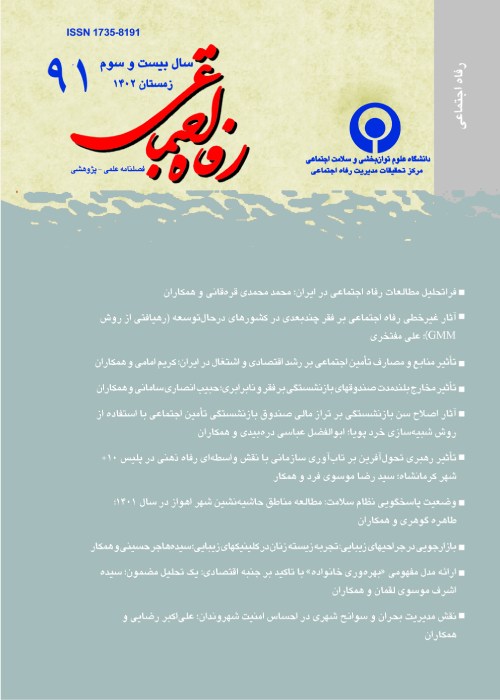Explanation of Adoptive Families’ Experiences of Adopted Children Problems: a Grounded Theory Approach
Adoption of a child is a complex social construct that is often challenging and does not always result in immediate happiness. Children who are adopted, particularly those with a history of adversity prior to adoption, are at the risk of developing problems in behavioral and emotional self-regulation, attention deficits, or inhibitory control; as well as problems due to attachment security have been specially observed among the children adopted in older ages. If adoptive parents are unaware of adopted children’s problems and unprepared to deal with these issues, they may become emotionally and psychologically incapacitated, so they may not be able to provide adequate care giving. Understanding the challenges faced by the adoptive families can empower them in finding solutions to help the child in bonding within the new family unit. Considering recent increase in child adoption prevalence as a family completing manner in Iran; few comprehensive studies have been done to verify adopted children’s behavioral or physical problems. Therefore, the present study aims to clarify challenges which adoptive families experience in this area.
To achieve the objectives of this study, a qualitative research was performed according to grounded theory approach. Thirty adoptive parents participated in this study. First, samples were selected through purposive sampling, then by theoretical sampling to achieve saturation. In-depth and semi-structured interviews were used for data collection. The data were analyzed using Strauss and Corbin’s (2018) approach. In this approach, constant comparative method was used for data collection and analysis. It consists of four stages: analyzing data for concepts, analyzing data for context, bringing process into the analysis, and integrating categories. The validity of findings was ensured through member assessment, data mining, deep description, and prolonged exposure to the research environment.
Six main categories emerged from the data analysis: “adoption threatening factors” represented phenomenon, “child’s physical and behavioral issues” appeared causal conditions, “child and environment potencies” appeared as a protective intervening factor, whereas “child’s preadoption adversities” and “influences of children with special needs” demonstrated threatening intervening conditions and “parenting strategies” displayed measures taken by adoptive parents in order to manage their adopted children. The category of “adoption satisfaction” was the consequence of applying these strategies. These results have reflected in following diagram:
Analyzing participants’ interviews revealed that most of the adopted children in the current study had been exposed to adverse circumstances during early childhood. Child’s preadoption adversities such as experiencing abuse or being neglected by their birth parents and early depriving institutional rearing was found to have a lasting impact on child’s physical and psychological health; in other words, internalizing or externalizing problems, attachment or adjustment problems such as emotion regulation problems, attention deficit/hyperactivity disorder (ADHD), oppositional defiant disorder (ODD), and attachment problems, specifically reactive attachment disorders (RAD) were the highly reported problems among the adopted children. Some adopted children having troubles in regulating their negative emotions acted out their grief in spurts of crying spells, tantrums, or violent or self-destructive behavior that made the adoptive parent feel shocked, helpless, and overwhelmed. Some prenatal predispositions such as prenatal exposure to drugs, unwanted pregnancy, and experiencing stressful environment by birth mother increase the tératogenèse likelihood of premature birth in adopted children. Therefore, the brain impairment or physical deficiencies were likely to occur. Some of these problems had not been diagnosed in institutions prior to adoption. Almost 40% of adoptive parents who participated in this study reported that their adopted children had at least one considerable medical problem that had not been diagnosed before adoption, or at least adoptive parent did not inform about disease. Moreover, among the adopted children, both the inhibited and disinhibited forms of RAD were reported. Some adoptive parent reported that their adopted children exhibited aversion from being hugged and preferred to sleep in their own bed; some other children were found to be friendly with strangers and were willing to go home with strangers, seek physical contact from or proximity to strangers. Most of the children in this study had cognitive and social skills deficiencies due to early neglect and privation background. In some cases adopted children had considerable language delays in time of adoption. In other words, at the time of adoption, adopted children demonstrated delays in all developmental domains, including gross and fine motor abilities, language, cognition, and social–emotional development. Adoptive parents who had children with special needs withstand more troubles and restrictions, and they were likely to spend more time and money to take their adopted children for severe treatments. Children’s behavioral problems or their incapability made the adoptive parents restrict their social relationships; therefore they got deprived of many positive affection reinforce circumstances. Even adoptive parents marital intimacy was likely to be affected. However, when children entered a more intimate, enriched, and stimulating environment and gain friendly and responsive care from their adoptive parents, many of them exhibited developmental improvement.
- حق عضویت دریافتی صرف حمایت از نشریات عضو و نگهداری، تکمیل و توسعه مگیران میشود.
- پرداخت حق اشتراک و دانلود مقالات اجازه بازنشر آن در سایر رسانههای چاپی و دیجیتال را به کاربر نمیدهد.


